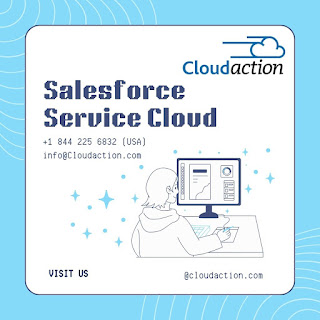Service Cloud Integration: Creating a Unified Service Ecosystem
Salesforce's Service Cloud is a comprehensive
customer service platform that provides tools and features to manage customer
inquiries, resolve issues, and deliver exceptional support. With its powerful
case management, knowledge base, and omni-channel support capabilities, Service
Cloud offered by salesforce
consulting services is the perfect solution for modern customer
service teams. But to truly unlock its potential, you need to integrate it with
other Salesforce products and third-party apps.
Seamless
Integration with Salesforce Products
Sales Cloud
Integration
One of the most common integrations is
between Service Cloud and Salesforce's Sales Cloud. This integration enables a
seamless flow of information between sales and customer service teams. When a
sales representative closes a deal in Sales Cloud, the customer's data,
history, and preferences are instantly accessible to the customer service team
in Service Cloud. This empowers service agents to provide a personalized
experience and resolve issues more efficiently.
Marketing
Cloud Integration
Integrating salesforce
service cloud with Marketing Cloud allows you to create highly
targeted and personalized customer journeys. When a customer interacts with
your support team, their data is synchronized with Marketing Cloud. This
information can be used to send tailored marketing communications, improving
customer engagement and loyalty.
Community
Cloud Integration
Community Cloud is another Salesforce product
that can be seamlessly integrated with Service Cloud. By doing so, you can
create self-service communities where customers can find solutions to common
issues, ask questions, and interact with other customers. These self-service
communities not only reduce the workload on your service agents but also
empower your customers to find answers independently.
Getting
Started with Service Cloud Integration
Integrating Service Cloud with other
Salesforce products and third-party apps is a strategic move for businesses
aiming to deliver exceptional customer service. To get started, you should:
Assess Your
Needs:
Identify the specific requirements and goals for your service ecosystem. What
Salesforce products and third-party apps are essential for your operations?
Select the
Right Tools: Choose the appropriate integration tools and connectors provided
by Salesforce, or work with a Salesforce-certified consultant to ensure
seamless integration.
Train Your
Team: Ensure
that your service agents and relevant teams are well-trained in using the
integrated tools. This is essential for maximizing the benefits of the
integrated service and salesforce
sales cloud ecosystem.
Monitor and
Optimize:
Continuously monitor the performance of your integrated service ecosystem and
make adjustments as needed to optimize processes and improve customer
experiences.





Comments
Post a Comment